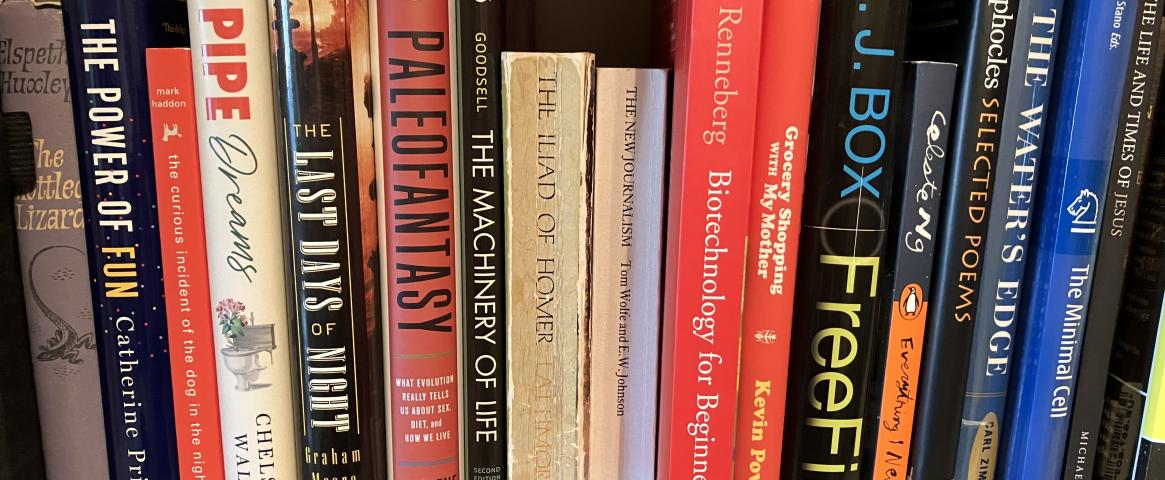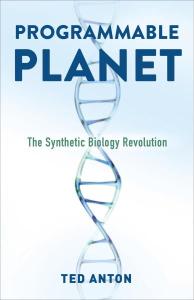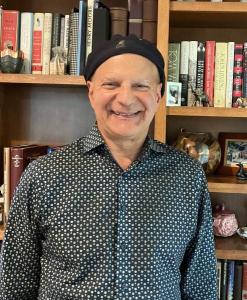
Ted Anton—Programmable Planet: The Synthetic Biology Revolution
THE SYNTHETIC BIOLOGY REVOLUTION
Ted Anton
Columbia University Press, July 25, 2023, $35
ISBN: 9780231205108
Anton reports:
My book tells the story of a science revolution: reengineering the fabric of life to make products we need. Changing life by changing DNA, often using microbe fermentation as in brewing beer, synthetic biology can help us make sustainable food, confront climate change, and fight novel viruses.
In the book, I explore the field from its beginning in fighting malaria to the COVID vaccine and beyond. Covering triumphs and blunders, I examine successes in energy production, plant gene editing, and chemical manufacturing, as well as controversial attempts at human enhancement.
The book grew out of my 2017 book on the microbiome, Planet of Microbes: The Perils and Potential of Earth’s Essential Life Forms. From the study of the world’s most numerous life forms, it was a small step to writing about efforts to genetically edit those microbes to make products we need. I started the book as a sci-fi novel---but then COVID superseded my imagination!I got numerous rejections. Then came the COVID vaccines and the Biden Administration’s $2 billion synthetic biology investment. Those events became the triumphal ending the book needed.
To fund my reporting, I applied for and received grants from my university. I attended conferences, worked in labs, and did lots of Zoom calls. I wrote the chapters following this formula: Narrative lead, then a concept paragraph, history, three points, opposite point of view, and return to the narrative lead. I mentioned events in my life—like visiting national parks with my family—to personalize the story.
What I wish I had known when I got started is that an mRNA vaccine would emerge to save the world and end the story!
My advice to aspiring writers is to go full steam ahead and consider independent publishers and university presses. They can give you the care that big book publishers cannot.
I am a newly retired English professor and would be happy to read anybody’s proposal. Email me at tanton@depaul.edu.
Contact info
- Ted Anton, tanton@depaul.edu, @AntonChekhov
- Book Programmable Planet: The Synthetic Biology Revolution
- Publicist: Robyn Massey, rm3785@columbia.edu
NASW members: will your book be published soon? Promote it by submitting your report for Advance Copy.
Tell your fellow NASW members how you came up with the idea for your book, developed a proposal, found an agent and publisher, funded and conducted research, and put the book together. Include what you wish you had known before you began working on your book, or had done differently.
See https://www.nasw.org/advance-copy-submission-guidelines.
View Advance Copy archives at https://www.nasw.org/member-article/advance-copy.
Thinking of writing a book? If you are a NASW member, you may access a list of more than 200 books and online resources to help you craft your book proposal, find an agent and funding sources, negotiate your contract, learn about self-publishing, publicize and market your book, and more at https://www.nasw.org/article/write-book.
Send book info and questions about book publishing to Lynne Lamberg, NASW book editor, llamberg@nasw.org.
Follow @LynneLamberg on Twitter for news about science/medical books, writing, and NASW authors.
Banner image adapted from original photo by Ted Anton.
NASW invites publishers and publicists to purchase NASW website ads to promote their authors and books. Visit https://www.nasw.org/node/add/ad to access NASW’s self-service purchasing portal.
Advance Copy
The path from idea to book may take myriad routes. The Advance Copy column, started in 2000 by NASW volunteer book editor Lynne Lamberg, features NASW authors telling the stories behind their books. Authors are asked to report how they got their idea, honed it into a proposal, found an agent and a publisher, funded and conducted their research, and organized their writing process. They also are asked to share what they wish they’d known when they started or would do differently next time, and what advice they can offer aspiring authors. Lamberg edits the authors’ answers to produce the Advance Copy reports.
NASW members: Will your book be published soon? Visit www.nasw.org/advance-copy-submission-guidelines for information on submitting your report.
Publication of NASW author reports in Advance Copy does not constitute NASW's endorsement of any publication or the ideas, values, or material contained within or espoused by authors or their books. We hope this column stimulates productive discussions on important topics now and in the future as both science and societies progress. We welcome your discussion in the comments section below.


